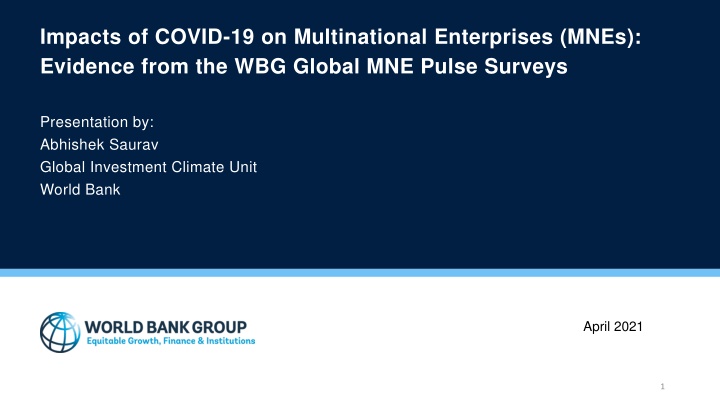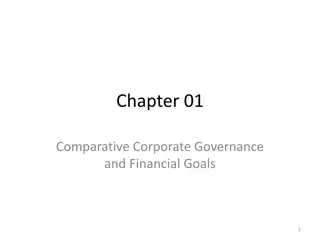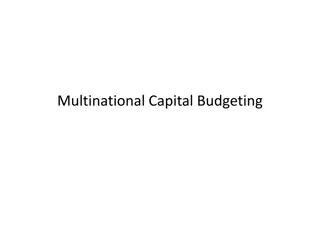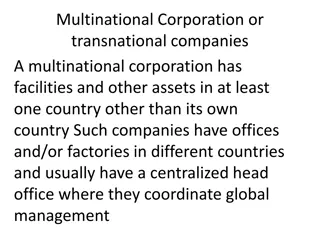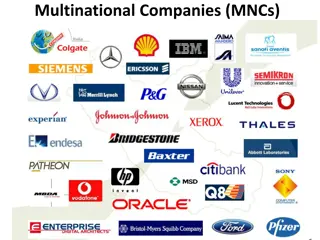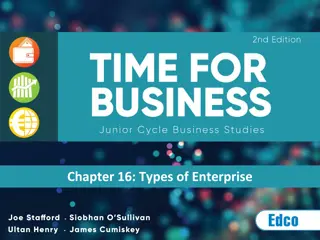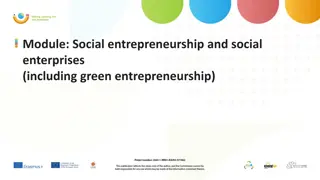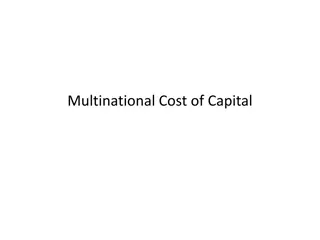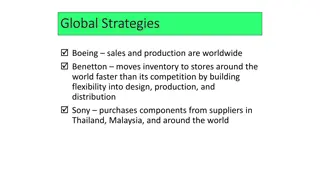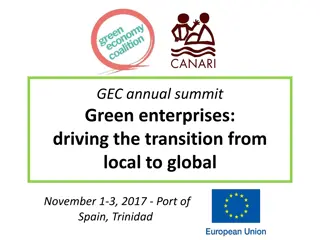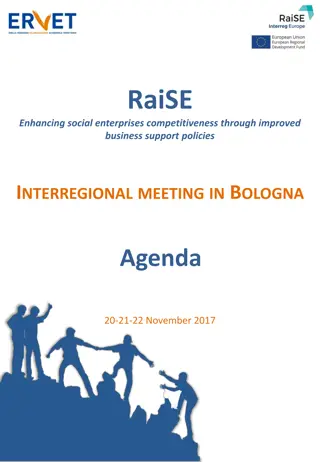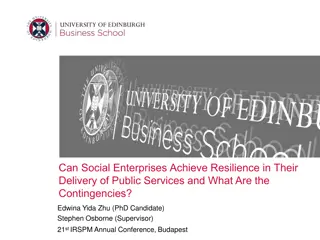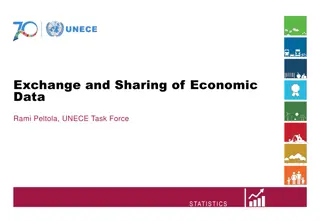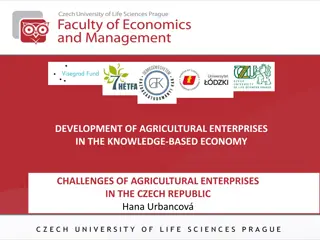Impacts of COVID-19 on Multinational Enterprises - Insights & Trends
Multinational Enterprises experienced significant shocks in 2020 due to the pandemic, with widespread and prolonged adverse effects on business dimensions such as supply chain, demand, output, and profit. Recent survey results show some improvement in Q4, indicating easing supply and demand shocks.
Download Presentation

Please find below an Image/Link to download the presentation.
The content on the website is provided AS IS for your information and personal use only. It may not be sold, licensed, or shared on other websites without obtaining consent from the author.If you encounter any issues during the download, it is possible that the publisher has removed the file from their server.
You are allowed to download the files provided on this website for personal or commercial use, subject to the condition that they are used lawfully. All files are the property of their respective owners.
The content on the website is provided AS IS for your information and personal use only. It may not be sold, licensed, or shared on other websites without obtaining consent from the author.
E N D
Presentation Transcript
Impacts of COVID-19 on Multinational Enterprises (MNEs): Evidence from the WBG Global MNE Pulse Surveys Presentation by: Abhishek Saurav Global Investment Climate Unit World Bank April 2021 1
Outline 1 MNE Pulse Survey research 2 MNE operations and investment plans 3 GVC shifts any evidence? 4 Coping mechanisms in a crisis 5 Lessons for policymakers 2
Background on the MNE Pulse Survey We have run quarterly MNE surveys since April 2020 to understand the effects of the crisis on MNEs affiliates, providing real-time insights First two rounds (Q1 and Q2 2020) were pilots, with ~100 respondents each More recent rounds (Q3 and Q4 2020) have increased in size and scope Each survey has >300 MNE affiliates (50 per WBG region) 50/50 split of manufacturing and services Respondents are senior executives in MNE affiliates operating in developing countries. 3
MNEs experienced a severe and prolonged shock in 2020 Share of respondents affected by the pandemic on at least one business dimension (Q1 n = 105; Q2 n = 78; Q3: n = 305; Q4: n = 329) The MNE Pulse Survey asks firms about their performance relative to 2019 across a range of business dimensions (e.g., supply chain, demand, output, profit) Results indicate the adverse effects of the pandemic have been widespread and prolonged More than 95% of firms reported adverse effects in Q1 through Q3, improving slightly in Q4 Notably, magnitude of impacts has eased gradually Our results indicate that MNE affiliates in manufacturing have been more affected than those in business services (e.g., IT, finance, professional services, and logistics). 4
Q4 results suggest supply and demand shocks are easing Share reporting adverse supply chain, demand, investment, and employment effects in Q4 (n = 329) The share of firms reporting adverse supply chain and demand effects in Q4 improved from Q3 2020 the incidence of adverse supply chain effects has decreased by 10 percentage points the incidence of adverse demand effects has decreased by 17 percentage points The share of firms reporting that they reduced investment in Q4 also improved from Q3 but around half still reported reduced employment Despite signs of improvement, around two-thirds still reported that output, revenue and profits were down (largely unchanged from Q3) 5
Investment plans are stabilizing but uncertainty remains Share of respondents expecting their parent to change its level of investment in the host country in the next 1-3 years (Q3: n = 305; Q4: n = 329) The investment outlook was negative in Q3, with many MNEs planning to reduce investment in the host country. Q4 data suggest that the investment outlook is stabilizing 75% of firms expect to maintain their current investment levels Very few (1%) plan to reduce investment Uncertainty about the recovery will naturally prevent firms from committing to new investments Only a quarter of firms are 'very certain' about their investment plans most are only 'somewhat certain' Share of respondents certain/uncertain about their parent's investment plans in Q4 (n = 329) This is consistent with the collapse in new greenfield FDI announcements (down 35% globally in 2020). 6
What about major GVC reorganization? So far, survey results offer limited evidence of a major reorganization of GVCs prompted by the pandemic. Among firms expecting investment to increase (17% of total), only a third cited nearshoring as a reason (6% of total) ... Most respondents (92%) reported they were not changing their input sourcing in Q4... 34% 92% ...and even fewer (one- fourth) cited reshoring as a reason (4% of total) ...and similarly, most did not expect there to be a change in the role of their host country operations in their supply chain 83% 25% Changes to sourcing and GVC structures require time, months or even years. Our forthcoming Global Investment Competitiveness Survey will investigate these shifts at the MNE HQ level. 7
MNEs supported their affiliates to cope with the crisis Share of respondents that received support from their foreign parent during the COVID crisis (Q3, n = 305) Networks of relationships between MNE parents, affiliates, and suppliers can generate benefits including technology transfer and finance. This occurred during crisis. Q3 survey results indicate that around 60% of MNE affiliates received some support from their foreign parent, mainly technology and guidance for operational continuity. Many MNE affiliates, in turn, provided support to their local suppliers (55%) Affiliates receiving support from HQ were more likely, by about 20 percentage points, to provide support to their suppliers. 8
COVID has increased adoption of technology and sustainability Share of respondents that adopted new technologies and approaches during the COVID crisis (Q4, n = 329) Nine-in-ten MNE affiliates increased their use of digital tools during the pandemic, for: E-commerce and customer engagement Managing supply chains Tools for remote working The focus on sustainability and decarbonization is now mainstream Automation and robotics are rapidly being adopted, particularly by affiliates that are HQed in developed countries (48% vs. 27%) 9
Opportunities for policymakers Share of respondents that expect their parent to invest more, that cite realised or expected changes in the policy environment as a reason (Q4, n = 56) Government support has been and remains important for most MNEs to manage the pandemic's impacts and restart production and investment We find that FDI Policy has a key role in shaping investment plans. This is consistent with literature. MNE affiliates that expect to invest more in the coming years, 9 out of 10 times identify the policy environment as a key driver 91% The investment environment is uncertain and expected to be competitive. But policymakers have a real opportunity - to undertake investment policy reforms that boost investor confidence. Attracting FDI will be critical to underpin a robust recovery. 10
Recap 1 MNE Pulse Survey research (monitor MNEs, Q1 2021 underway) 2 MNE operations and investment plans (gradually improving, uncertainty) 3 GVC shifts any evidence? (limited nearshoring or reshoring) 4 Coping mechanisms in a crisis (technology and sustainability) 5 Lessons for policymakers (FDI reforms to support recovery) 11
